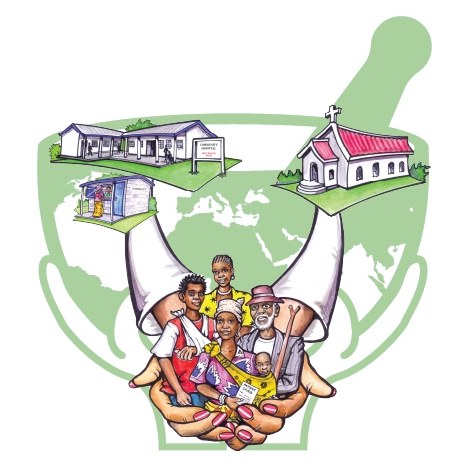 In 1981 the World Council of Churches started, within its Christian Medical Commission, a programme to address pharmaceutical issues in Church Health Systems. This programme evolved over the years into what is now the Ecumenical Pharmaceutical Network: an independent non-profit Christian membership organization.
In 1981 the World Council of Churches started, within its Christian Medical Commission, a programme to address pharmaceutical issues in Church Health Systems. This programme evolved over the years into what is now the Ecumenical Pharmaceutical Network: an independent non-profit Christian membership organization.
Over the years, our organization, with its many members and partners, has worked with church health systems in various areas such as capacity building of pharmacy professionals, improving quality of medicines, raising the profile of church pharmaceutical agencies, advocacy for increased access to anti-retrovirals and improving access to relevant pharmaceutical information.
In 2011, Ecumenical Pharmaceutical Network commemorates 30 years
of existence and 30 years of hard work towards strengthening pharmaceutical
services in church health systems.
In its strategy 2010–2015, EPN has defined the following four priority areas: Access to Medicines; HIV and AIDS care and treatment; professionalization of pharmaceutical services; and pharmaceutical information sharing. In addressing these priority areas with specific programmes, we seek to promote approaches that address strengthening of the health system as a whole, working specifically with Church-based organizations. It is estimated that up to 40% of health services in a number of African countries are provided by churches. This contribution is critical for the attainment of the Millennium Development Goals (MDGs) on health. We therefore seek to work with these church systems to ensure that their pharmaceutical services are efficient and effective and guarantee availability of affordable quality medicines to all who need them, targeting especially the poor and the under-served.
Priority areas and examples of our work
- Access to medicines: Wholistic approach towards increasing access that addresses supply systems, medicine use, quality of medicines, pharmaceutical care and affordability.
- International networking and collaboration: More than 75 anglophone and francophone members from over 30 countries across the world.
- Professionalism and good governance: Institutional strengthening through capacity building and distribution of tools to impact governance.
- Training on pharmacy for health facility staff: Provision of guidelines and standards to strengthen pharmacy practice.
- Sharing pharmaceutical information: Electronic and printed bulletins; guidelines for effective and efficient pharmaceutical services support health facility managers, pharmaceutical personnel and all those involved in pharmaceutical service delivery to increase access to medicines and improve quality of patient care.
- Campaign against antimicrobial resistance: Country-based activities on rational use of antibiotics and implementation of hospital-based infection control interventions reached more than 500 health professionals in 2010.
- The HIV and AIDS Treatment Literacy Guide for Church Leaders is a must read for every church leader who wants to address the issue of stigma and discrimination in the church and learn how to care for those infected and affected by the virus. It is available in English and French.
- EPN also offers Treatment Literacy Courses for Church Leaders on invitation from any church or other group. The course can be organized in intensive or modular sessions.
Moving towards impact
EPN strives to ensure that all the work we do has an impact on our ultimate beneficiaries: children, women and men who are in need of health and those who are entrusted with helping them attain good health. The work being done on reducing hospital acquired infections in the Network is one example:
A series of measures implemented at Mboppi Hospital in Douala, Cameroon in 2010 with support from EPN and funding from ReAct are expected to have a major impact on reducing maternal morbidity and mortality at the hospital. The measures which include implementation of a system to properly dispose of placentas, provision of waste disposal containers, hand washing consumables and equipment and assorted cleaning materials, are expected to significantly reduce the spread of infections in the maternity unit. Infection is one of the major direct causes of maternal morbidity and mortality in the hospital.
A Network – and a Network member
After applying for membership in June 2010, EPN formally joined the MMI Network in November last year. In a short period of membership, we have already benefited from the frequent contact with the MMI Secretariat and the sharing of information that goes on within the network. We can see how MMI is truly a global platform and we look forward to future opportunities for networking, collaboration and joint advocacy.
Download the illustrated contribution to the Annual Report 2010 of the MMI Network as a PDF file. Author: Elisabeth Goffin, info@epnetwork.org
